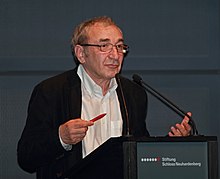Arseny Roginsky
| Arseny Borisovich Roginsky | |
|---|---|

Arseny Roginsky at the Memorial society, 29 April 2012
|
|
| Native name | Арсений Борисович Рогинский |
| Born |
March 30, 1946 Velsk |
| Citizenship |
|
| Nationality | Russian |
| Fields | history |
| Institutions | |
| Alma mater | University of Tartu |
| Notable awards |
|
| Spouse | Natalya Frumkina |
|
Website www |
|
Arseny Borisovich Roginsky (Russian: Арсе́ний Бори́сович Роги́нский; born 30 March 1946, Velsk) is a Soviet dissident and Russian historian. He is one of the founders of the international historical and civil rights society Memorial, its head.
He was born to a family of a repressed engineer from Leningrad, in his place of exile.
In 1968, he graduated from the History and Philology Faculty of the University of Tartu.
From 1968 to 1981, Roginsky lived in Leningrad and worked as a bibliographer at the Saltykov-Shchedrin Public Library, then as a teacher of Russian language and literature in evening schools. As a scientist, he studied the 20th-century history of Russia, particularly the 1920s and the history of the destruction of the Socialist Revolutionary Party and subsequent political repression in the Soviet Union.
From 1975 to 1981, he was an editor of samizdat collections of historical works Memory being published abroad from 1978.
On 4 February 1977, a search was conducted in Roginsky’s apartment. On 16 June 1977, he was given a warning according to the decree of the Presidium of the USSR Supreme Soviet of 25 December 1972. After another search conducted on 6 March 1979, at the request of the KGB he was fired from the school where he worked. From 1979 to 1981, Arseny Roginsky was registered as a literary secretary of writer Natalia Dolinina and professor Jacob Lurie to avoid charges of "parasitism." In April 1981, Roginsky was urged to emigrate from the Soviet Union but he did not.
On 12 August 1981, Roginsky was arrested on Article 196—"the forgery and the production and sale of forged documents," and accused of transferring materials abroad to anti-Soviet publications such as Pamyat, a historical journal. As a final word in the court, he gave a speech "The situation of a historian in the Soviet Union" (published by the Russkaya Mysl newspaper). He served time in full, was released in 1985 and fully rehabilitated in 1992.
...
Wikipedia
